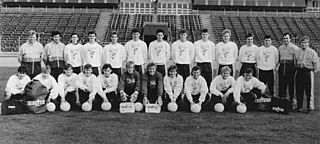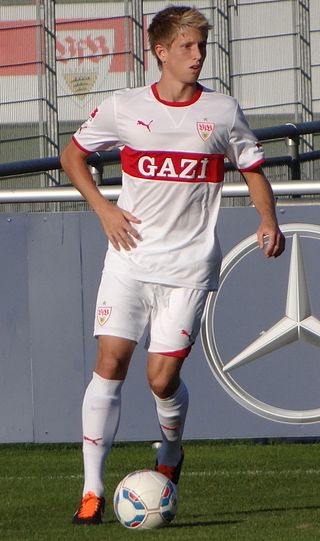Related Research Articles

Armin Veh is a German football manager and former player who last managed Eintracht Frankfurt. He won the German championship with Bundesliga team VfB Stuttgart in 2007. Veh and his team also had the chance to win "the double" by winning the DFB-Pokal on 26 May 2007 in Berlin, but lost 3–2 in extra time against 1. FC Nürnberg. From 11 December 2017 to 8 December 2019, Veh was the sports director of 1. FC Köln. During his playing career, he played as a midfielder.

Jörn Lenz is a German former professional footballer who played as a defender. Lenz had four different spells with BFC Dynamo during his professional playing career and has continued to serve as part of the club's backroom staff since retiring in 2008. Lenz played a total of 374 matches for BFC Dynamo between 1988 and 2008. He made two appearances for BFC Dynamo in the 1989-90 European Cup Winners' Cup.

RasenBallsport Leipzig e.V., commonly known as RB Leipzig or informally as Red Bull Leipzig, is a German professional football club based in Leipzig, Saxony. The club was founded in 2009 by the initiative of the company Red Bull GmbH, which purchased the playing rights of fifth-tier side SSV Markranstädt with the intent of advancing the new club to the top-flight Bundesliga within eight years. The men's professional football club is run by the spin-off organization RasenBallsport Leipzig GmbH. RB Leipzig plays its home matches at the Red Bull Arena. The club nickname is Die Roten Bullen.
Radovan Vujanović is an Austrian-Serbian former professional footballer who played as a forward.

Sebastian Schuppan is a German former professional footballer who played as a midfielder. He serves as the sporting director of Würzburger Kickers.

Sebastian Hertner is a German professional footballer who plays as a defender for Oberliga Hamburg club ETSV Hamburg.
Erik Domaschke is a German professional footballer who plays as a goalkeeper for SV Meppen.
The 2013–14 3. Liga was the sixth season of the 3. Liga, Germany's third-level football league.
The 2013–14 RB Leipzig season was the 5th season in the club's football history and their first season competing in the professional & national level in Germany. Leipzig participated in the 2013–14 3. Liga season after winning the promotion playoff.
The 2013–14 SSV Jahn Regensburg season was the 107th season in the club's football history. In 2013–14 the club played in the 3. Liga, the third tier of German football. The club was relegated from the 2. Bundesliga in this league. Regensburg finished the league in 11th place.
The 2015–16 DFB-Pokal was the 73rd season of the annual German football cup competition. Sixty-four teams participated in the competition, including all teams from the previous year's Bundesliga and the 2. Bundesliga. It began on 7 August 2015 with the first of six rounds and ended on 21 May 2016 with the final at the Olympiastadion in Berlin, a nominally neutral venue, which has hosted the final since 1985. The DFB-Pokal is considered the second-most important club title in German football after the Bundesliga championship. The DFB-Pokal is run by the German Football Association (DFB).
Angelina Lübcke is a German footballer who plays as a striker for women's Regionalliga Nordost club Türkiyemspor Berlin.
The 2017–18 DFB-Pokal was the 75th season of the annual German football cup competition. Sixty-four teams participated in the competition, including all teams from the previous year's Bundesliga and the 2. Bundesliga. The competition began on 11 August 2017 with the first of six rounds and ended on 19 May 2018 with the final at the Olympiastadion in Berlin, a nominally neutral venue, which has hosted the final since 1985. The DFB-Pokal is considered the second-most important club title in German football after the Bundesliga championship. The DFB-Pokal is run by the German Football Association (DFB).
The 2018–19 DFB-Pokal was the 76th season of the annual German football cup competition. Sixty-four teams participated in the competition, including all teams from the previous year's Bundesliga and the 2. Bundesliga. The competition began on 17 August 2018 with the first of six rounds and ended on 25 May 2019 with the final at the Olympiastadion in Berlin, a nominally neutral venue, which has hosted the final since 1985. The DFB-Pokal is considered the second-most important club title in German football after the Bundesliga championship. The DFB-Pokal is run by the German Football Association (DFB).
The 2020–21 DFB-Pokal was the 78th season of the annual German football cup competition. Sixty-four teams participated in the competition, including all teams from the previous year's Bundesliga and 2. Bundesliga. The competition began on 11 September 2020 with the first of six rounds and ended on 13 May 2021 with the final at the Olympiastadion in Berlin, a nominally neutral venue, which has hosted the final since 1985. The competition was originally scheduled to begin on 14 August 2020 and conclude on 22 May 2021, though this was delayed due to postponement of the previous season as a result of the COVID-19 pandemic. The DFB-Pokal is considered the second-most important club title in German football after the Bundesliga championship. The DFB-Pokal is run by the German Football Association (DFB).
The 2021–22 DFB-Pokal was the 79th season of the annual German football cup competition. Sixty-four teams participated in the competition, including all teams from the previous year's Bundesliga and 2. Bundesliga. The competition began on 6 August 2021 with the first of six rounds and ended on 21 May 2022 with the final at the Olympiastadion in Berlin, a nominally neutral venue, which has hosted the final since 1985. The DFB-Pokal is considered the second-most important club title in German football after the Bundesliga championship. The DFB-Pokal is run by the German Football Association (DFB).
The 2022–23 DFB-Pokal was the 80th season of the annual German football cup competition. Sixty-four teams participated in the competition, including all teams from the previous year's Bundesliga and 2. Bundesliga. The competition began on 29 July 2022 with the first of six rounds and ended on 3 June 2023 with the final at the Olympiastadion in Berlin, a nominally neutral venue, which has hosted the final since 1985. The DFB-Pokal is considered the second-most important club title in German football after the Bundesliga championship. The DFB-Pokal is run by the German Football Association (DFB).
The 2023–24 DFB-Pokal was the 81st season of the annual German football cup competition. Sixty-four teams participated in the competition, including all teams from the previous year's Bundesliga and 2. Bundesliga. The competition began on 11 August 2023 with the first of six rounds and ended on 25 May 2024 with the final at the Olympiastadion in Berlin, a nominally neutral venue, which has hosted the final since 1985. The DFB-Pokal is considered the second-most important club title in German football after the Bundesliga championship. The DFB-Pokal is run by the German Football Association (DFB).

RB Leipzig are a German women's football club based in Leipzig that competes in the Bundesliga, the top tier of football in Germany. Their second team has been part of the Regionalliga since 2020.
Pelle Boevink is a Dutch professional footballer who plays as a goalkeeper for 2. Bundesliga club SC Paderborn.
References
- ↑ "Tim Sebastian". Kicker (in German). Retrieved 31 July 2017.
- ↑ "Tim Sebastians Lebensmotto: "Niemals aufgeben!"". FC Hansa Rostock (in German). 24 April 2007. Retrieved 5 May 2016.
- ↑ "Tim Sebastian: So habe ich es zum Profi geschafft". FC Hansa Rostock (in German). 31 March 2008. Retrieved 22 December 2015.
- ↑ "Tim Sebastian kehrt zum F.C. Hansa zurück". FC Hansa Rostock (in German). 27 May 2009. Retrieved 21 December 2015.
- ↑ "RasenBallsport Leipzig - Türkiyemspor Berlin 1:1". Kicker (in German). 6 August 2010. Retrieved 21 December 2015.
- ↑ "RB Leipzig gewinnt Sachsen-Pokal". Sächsische Zeitung (in German). Dresden: Sächsische Zeitung GmbH. 1 June 2011. Retrieved 21 December 2015.
- ↑ "Vertragsverlängerung! Tim Sebastian bleibt ein Roter Bulle!". Die roten Bullen (in German). 7 April 2014.
- ↑ "Erfahrener Verteidiger" [Veteran defender] (in German). SC Paderborn 07. 14 January 2016. Retrieved 14 January 2016.
